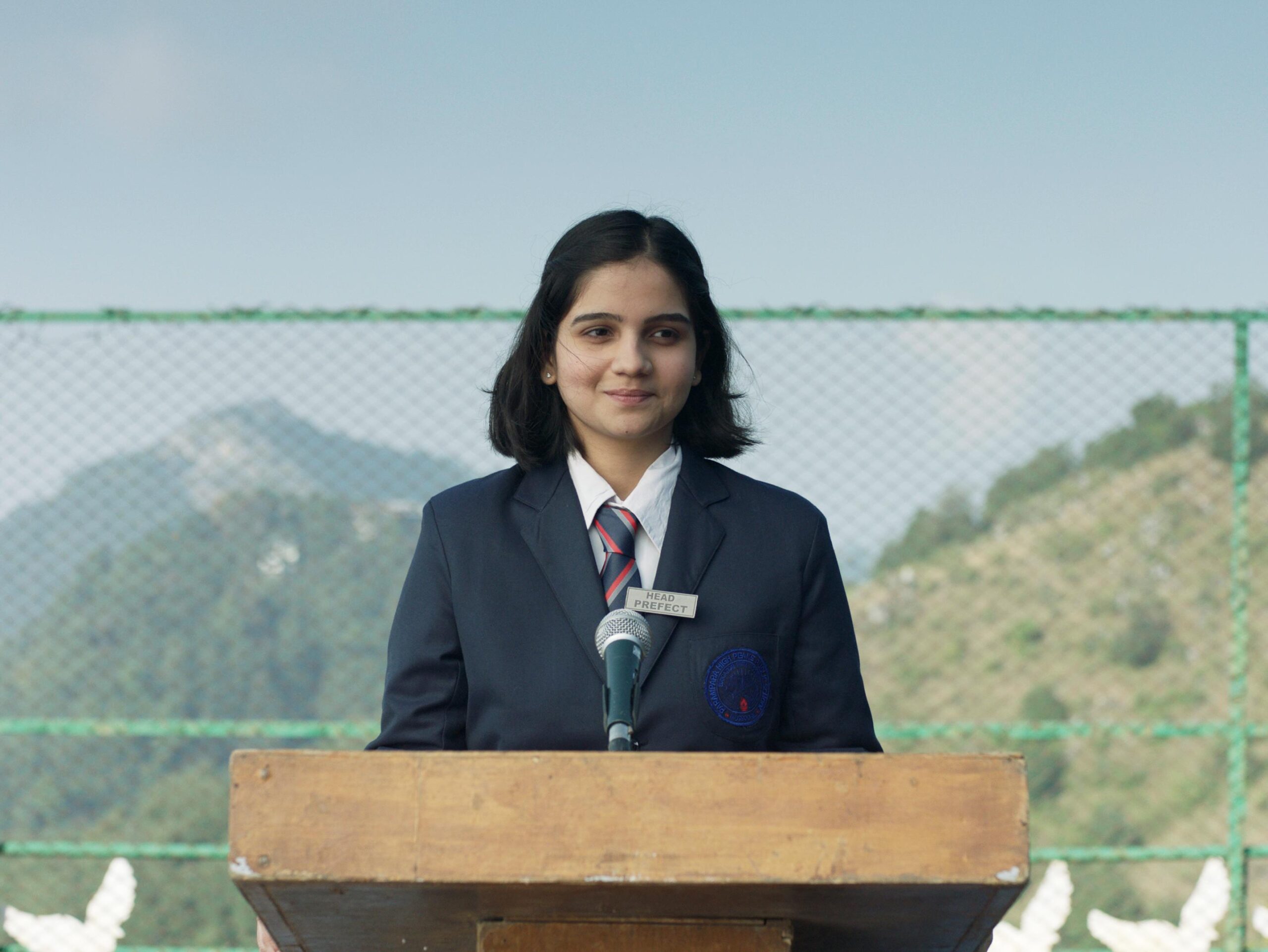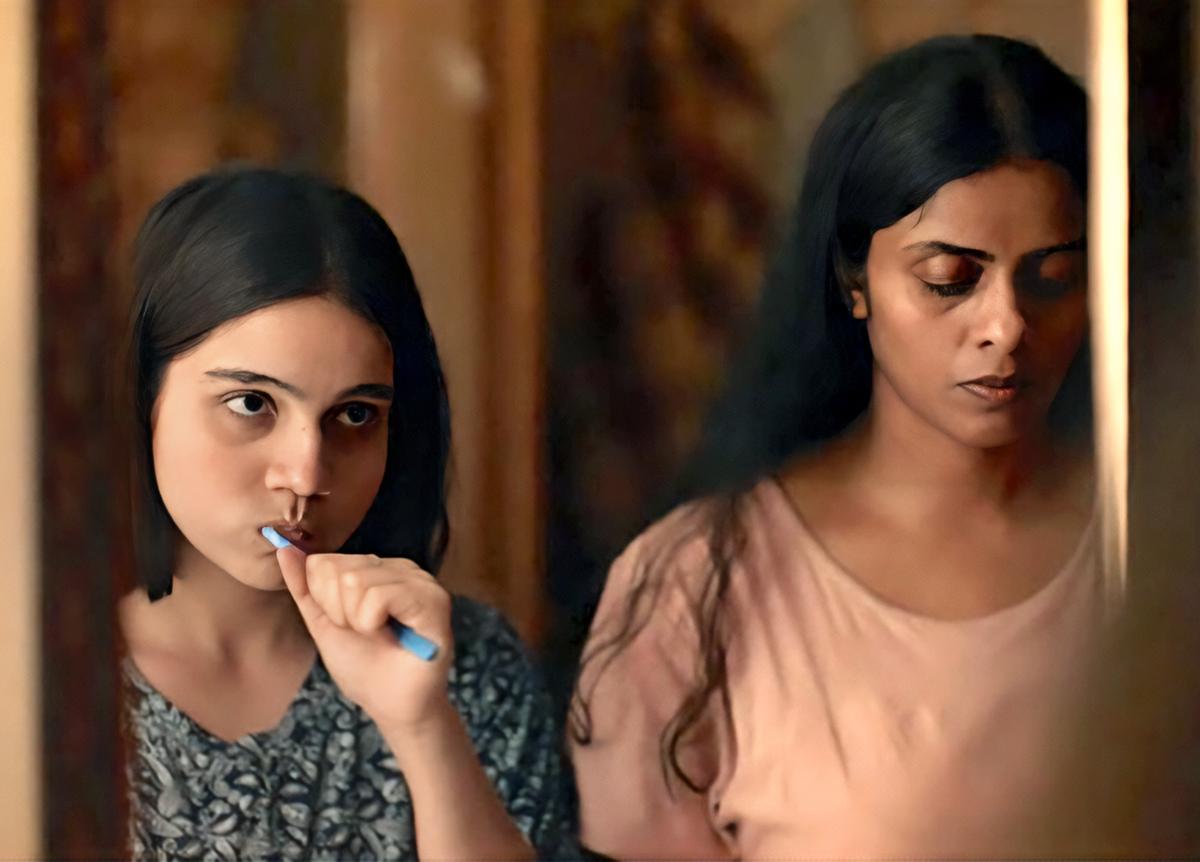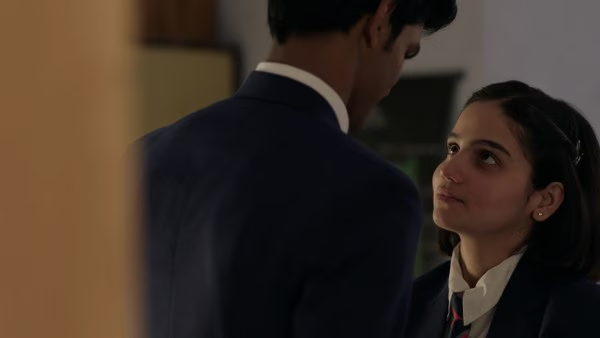Directed by Shuchi Talati, Girls Will Be Girls is a well-knit story with subtle yet impactful reminders of social norms, adolescence, and sexual awakening. Starring Preeti Panigrahi (Mira), Kani Kusruti (Anila), and Kesav Binoy Kiron (Sri), the coming-of-age narrative has garnered multiple nominations and awards, such as the audience award at the Sundance Film Festival.
The story unfolds in a conservative co-ed boarding school in the mountains. The school oath emphasises honoring “our age-old Indian culture”, while the strict rules mostly focus on girls, such as appropriate skirt lengths, and rolled-up socks.
The trajectory of the plot centers on Mira, the head prefect of her school. Mira develops a crush on her classmate Sri, who is mature beyond his years like her. Sri is invited by Anila (Mira’s mother) to their home, and as the story progresses, the three gradually form an unorthodox relationship.
Girls Will Be Girls is realistic in many ways. The characters are unaware of their own contradictions, how social constructs influence our daily lives, and the dominance of power. The film also explores the realisation of these dynamics during adolescence.
Characters in Girls Will Be Girls
Anila
From Anila’s first scene, we learn that she is not one to abide by unnecessary rules. Her unwillingness to stand outside the school gate to meet Mira highlights her nonconformist attitude, while also establishing how she unapologetically invades Mira’s space—a subtle foreshadowing of the tension to come.
Anila and Mira share a friend-like bond. From randomly dancing to songs on the radio to helping Mira wax her legs, Talati captures their intimate bond masterfully. This is not to conclude that Anila lacks motherly instincts, which are most strongly portrayed when she aids Mira’s rescue on Teacher’s Day or catches Mira talking on the phone during odd night hours.
Girls Will Be Girls focuses on two women from different generations. Anila is not an authoritative parent and does not restrict Mira’s life. She is focused on creating a safe environment for her daughter, inviting Mira’s crush over to their place, allowing her to dress as she pleases, and even standing up for her in front of her father—freedoms that Anila likely didn’t have growing up.
Anila tries to break the cycle of patriarchy passed down from one generation to the next. She admits to Ms. Bansal that she is aware Sri is visiting her home and that she is the one who gets to decide who is allowed in.
In a way, Anila’s parenting style represents a rebellion against the norms most women are raised with, offering Mira the space to define herself.
Mira
Preeti Panigrahi brings Mira’s character to life with tenderness and finesse. She elegantly captures the emotions of passion, rage, resentment, and the pain of heartbreak. Her performance is a delicate balance of vulnerability and strength, drawing the audience into the depth of Mira’s inner turmoil and growth.
Mira’s character begins as an archetype of the socially accepted “good girl.” She is the first female Head Prefect in her school’s long history, her teachers hold high expectations from her. Celebrated by her friends, teachers, and mother, Mira enjoys the admiration that comes with her position.

However, the glossy phase of Mira’s life doesn’t last long, as every advantage comes with a trade-off. With the responsibility of being Head Prefect, Mira realises she has to enforce rules on her friends, making her unlikeable.
When she catches a group of boys taking inappropriate pictures of girls without their consent, and they are punished for it, Mira becomes a target. She is blamed for complaining and finds herself abandoned by her peers.
As Mira and Sri begin to grow closer, their budding relationship is interrupted by Anila, who, in the guise of ensuring nothing happens between them, creates an awkward and unsettling environment.
The complexities of this dynamic and the authority of being a head prefect expose Mira to the social constructs and harshness of life.
Shift in Anila and Mira’s relation – Girls Will Be Girls
Anila’s unorthodox parenting comes with a price. Although she provides Mira with freedom and teaches her to be open-minded, she is also envious of the same freedom and feels discontented with how much Mira is able to explore at such a young age.
Anila invites Sri over so that Mira and Sri can meet under her supervision, but she gradually inserts herself into their relationship. She creates a series of discomforting situations that are both awkward and embarrassing to witness.
Anila’s unsettling behavior begins when she asks Sri to close his eyes while she walks out of the washroom wrapped in a towel. In these moments, Anila takes on the persona of a teenager trying to seduce her crush, such as letting Sri sleep in her bed while she sits next to him reading erotica. She even leaves Mira’s drinks in the kitchen, eyeing her to get them on her own, a bold move to isolate her at her own home.

Around Sri, Anila adopts the role of a jealous friend, denying Mira the chance to spend any private time with him on his birthday. Anila and Sri sleep in the same bed, and she even goes ahead to shut the door lock. Brilliantly directed and acted, this entire scene is crafted to be unnerving, building a palpable tension.
Mira becomes emotionally fragile trying to grasp the reality that her once supportive mother is jealous of her. Mira and Anila begin an unsaid rivalry for Sri’s attention.
This turn in the story, perhaps the most unconventional plot point, is discomforting. Sri enjoys the attention from Anila and never questions or attempts to stop her behavior. Despite knowing that their actions are making Mira’s environment increasingly hostile, he goes along with it.
Talati has designed Anila and Mira’s communication without words but rather by exchanging glances, silences, and rifts. The two have a breaking point when Mira asks Anila to leave her school. Yet, her motherly instincts resurface when Mira calls her to pick her up.
Lack of Self-awareness
The lack of self-awareness in every character makes the film feel more lifelike and relatable. People often contradict themselves, act superior while judging others, and fail to recognize their own hypocrisy. Girls Will Be Girls captures this human tendency, using its characters’ flaws to explore the complex dynamics of adolescence and authority.
While Anila plays the role of someone who rejects societal norms, she is still financially dependent on her husband. Mira reprimands her classmate for speaking to boys; while she spends her time with Sri.

Ms. Bansal, on the other hand, fails to see the flaw in her approach: teaching girls how to dress appropriately while neglecting to take action when boys take photos of girls without their consent.
Her response to the boys’ actions is to blame the girls for not dressing properly, claiming she can’t always be there to supervise. She even goes so far as to say that the issue is serious enough to warrant suspension.
Mira’s classmates label her a “slut” for complaining about the boys’ behavior, rather than holding the boys accountable for their actions.
The misuse of power when given authority is another theme that plays out seamlessly in the film. On Teacher’s Day, the boys from Mira’s class stage a rebellion against her, even preventing other students from taking the pledge. The abuse of power—however minor the authority—becomes glaring. The boys chase her out of the school and into the girls’ hostel where she has to shut herself inside a room to protect herself.
Hardik, who earlier in the film expresses his feelings for Mira, begins to resent her after she rejects him. He uses this rejection as an excuse to justify his misbehavior.
Ultimately, Girls Will Be Girls masterfully portrays the complexities of growing up, where self-awareness is often clouded by societal pressures and personal contradictions. The film highlights how these flaws shape relationships, challenge authority, and ultimately define one’s journey toward maturity.
Navigating Adolescence and Life with Shuchi Talati – Girls Will Be Girls
Girls Will Be Girls lacks a clear villain. Instead, it subtly illuminates the pervasive influence of social constructs, the complexities of adolescence, and the discomfort of an unsettling relationship.
Shuchi Talati masterfully captures the emotional depth of a high school relationship—its innocent beginnings, the inevitable heartbreak, and the raw turbulence of youth. In an interview she notes that she “started to write from a place of anger and rebellion.” The film serves as a poignant reminder of the challenges of growing up, beautifully conveying the confusing, often painful lessons learned during adolescence.
Talati has crafted an intricate, tender narrative, exploring the fragile emotions of longing without casting judgment on any character. The mistakes and missteps of the characters are portrayed with empathy, allowing the audience to relate to their imperfections without feeling condemnation. The film excels in showing rather than telling, a perfect example of the “show, don’t tell” principle.
Rather than providing clear answers or closure, Talati leaves many questions unanswered—much like life itself. We are left unsure whether Mira loved Sri, or if she was simply clinging to the idea of their relationship. Similarly, the ambiguity surrounding Sri and Anila’s connection adds to the film’s complexity, blurring the lines between certainty and doubt. In this way, Girls Will Be Girls, mirrors the messy, unresolved nature of real-life experiences, where not everything has a definitive conclusion.